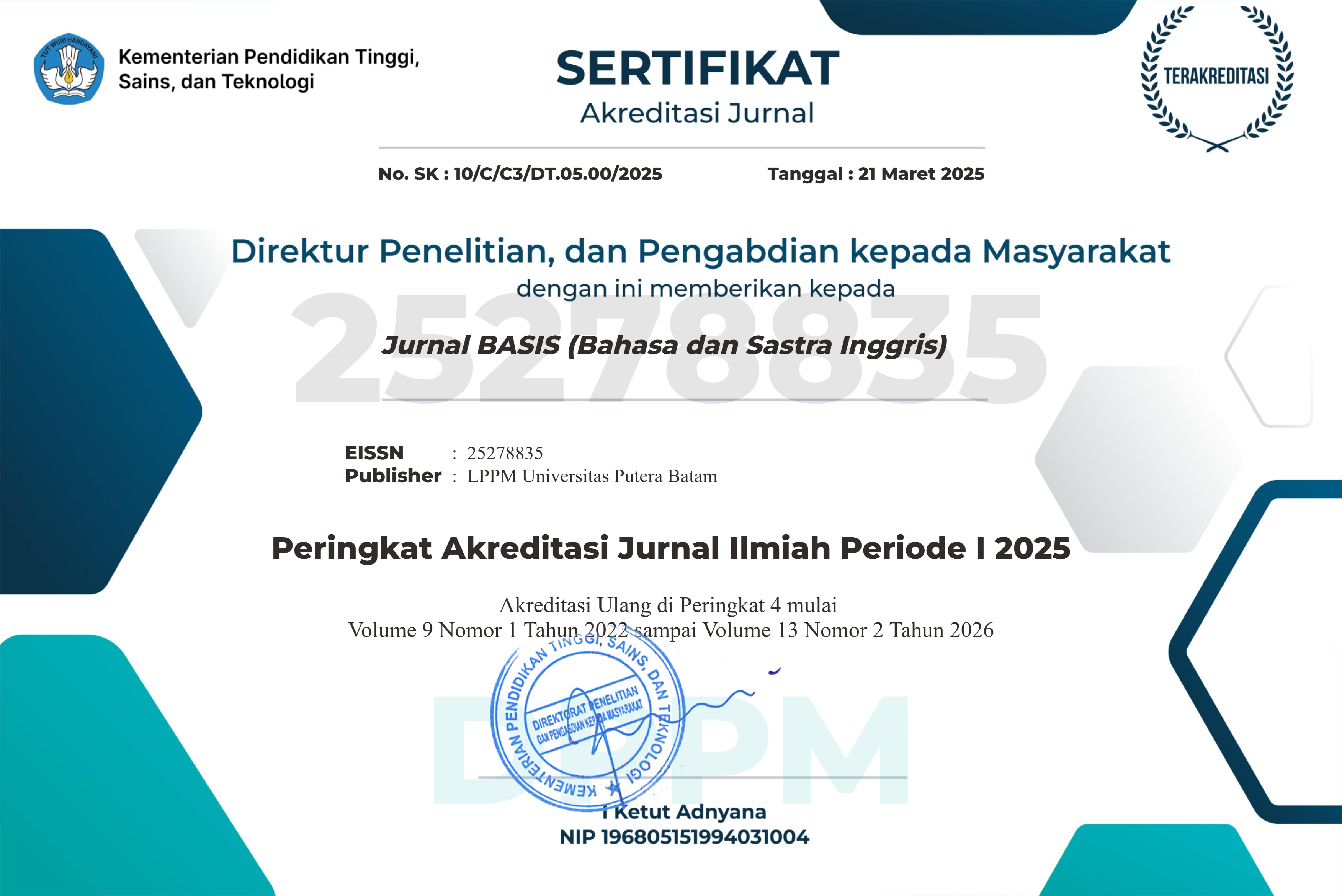Kerancuan Identitas Diaspora dalam Cerpen Randa Jarrar, Him, Me, Muhammad Ali
DOI:
https://doi.org/10.33884/basisupb.v10i1.7220Kata Kunci:
identitas budaya; diaspora; homeland; hostlandAbstrak
Penelitian ini bertujuan untuk membongkar kerancuan identitas yang dialami individu diaspora dalam cerita pendek Him, Me, Muhammad, yang ditulis oleh Randa Jarrar. Cerpen ini memotret kehidupan seorang diaspora yang tidak mudah dalam menerima perbedaan budaya antara homeland dan hostland. Jarrar menggambarkan bagaiman menjadi seorang Muslin di negara Barat benar-benar berdampak dengan komples pada identitas budaya. Cerpen ini dianalisis dengan menggunakan konsep identitas budaya dan diaspora dari Stuart Hall. Sementara itu, metode yang digunakan adalah kualitatif deskriptif. Hasil penelitian menunjukkan seorang diaspora akan mengalami pergolakan identitas budaya yang kompleks. Individu diaspora ini akan memiliki identitas yang rancu, identitas yang tidak bisa ditentukan secara utuh. Individu ini berada di persemangan identitas, antara homeland (Muslim) dan hostland (Barat)
Referensi
Adamczyk, A., & Hayes, B. E. (2012). Religion and sexual behaviors: Understanding the influence of Islamic cultures and religious affiliation for explaining sex outside of marriage. American Sociological Review, 77(5), 723-746. doi: 10.1177/0003122412458672
Albar, M. (2012). Organ transplantation: A Sunni Islamic perspective. Saudi Journal of Kidney Diseases and Transplantation, 23(4), 817. doi: 10.4103/1319-2442.98169
Alghaberi, J. A. (2018). The Concept of ‘Home’ in Palestinian Diaspora Fiction: A Critical Study of Randa Jarrar’s Fiction. Langkawi: Journal of the Association for Arabic and English, 4(1), 13. doi: 10.31332/lkw.v4i1.765
Fitria, S. (2022). Akhil Sharma’s Family Life: Regretting Doubleness of Diaspora Individuals. Poetika, 10(1), 61. doi: 10.22146/poetika.v10i1.64292
Hall, S. (1990). Cultural Identity and Diaspora. In J. Rutherford (Ed.), Identity: Community, Culture, Difference (pp. 222-237). London: Lawrence & Wishart.
Hoseini, S. S. (2013). Masturbation: Scientific Evidence and Islam’s View. Journal of Religion and Health, 56(6), 2076–2081. doi: 10.1007/s10943-013-9720-3
Huang, W. J., Haller, W. J., & Ramshaw, G. P. (2013). Diaspora Tourism and Homeland Attachment: An Exploratory Analysis. Tourism Analysis, 18(3), 285–296. doi: 10.3727/108354213x13673398610691
Huddleston, C. A. (2008). Ashes to ashes: When families choose cremation. Journal of Christian Nursing, 25(3), 138–141. doi: 10.1097/01.cnj.0000326269.78869.3f
Jarrar, R. (2016). Him, Me, Muhammad Ali. Louiseville: Sarabande Books.
Kanitz, J. (2021). The Headscarf as a Business Card: A Qualitative Case Study on Styles and Expressions of Berlin Muslim Women (1st ed. 2021). Springer VS.
Laxmiprasad, P. V. (2020). Diasporic Literature - An Overview. Journal of English Language and Literature, 7(3), 98-106. doi: 10.33329/joell.7.3.20.98
Merriam, S. B., & Tisdell, E. J. (2015). Qualitative Research: A Guide to Design and Implementation (4th ed.). John Wiley & Sons.
Öztarhan, E. (2018). Home in Contemporary Arab American Literature: Randa Jarar’s A Map of Home. Ettawassol El Adabi, 11, 261–277. doi: 10.12816/0051091
Raina, J. A. (2017). Theorizing Diaspora Literature: A Review of Key Concepts. Scholarly Research Journal for Humanity Science & English Language, 4(23), 6469-6474.
Taylor, S. J., Bogdan, R., & DeVault, M. (2015). Introduction to Qualitative Research Methods: A Guidebook and Resource (4th ed.). Wiley.
Zhu, J. J., & Airey, D. (2021). Diaspora Chinese tourism: Cultural connectedness and the existing academic insights. Tourism Management Perspectives, 40, 100916. doi: 10.1016/j.tmp.2021.10091













 JURNAL BASIS (BAHASA DAN SASTRA INGGRIS)
JURNAL BASIS (BAHASA DAN SASTRA INGGRIS)
